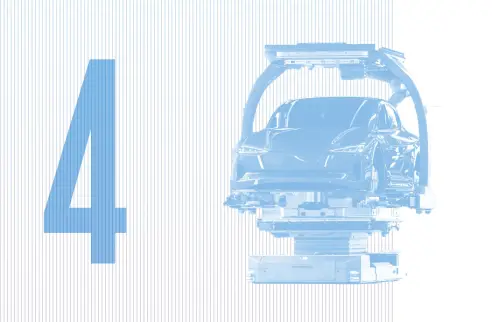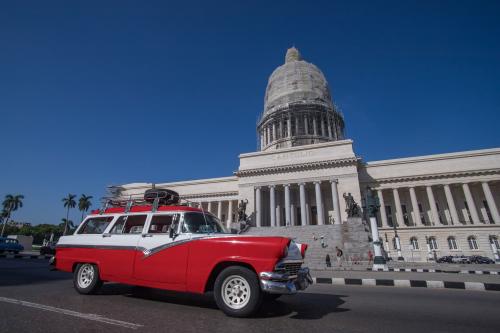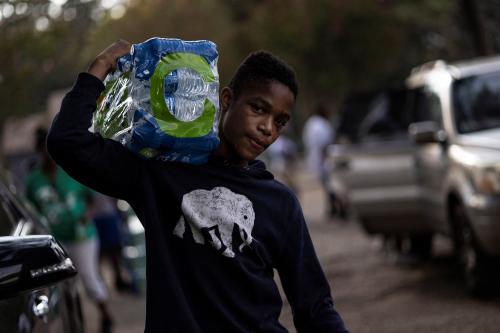On Friday, August 8, 2014, IMF Deputy Managing Director Min Zhu issued the following short statement:
“Today, IMF Management received a formal request from the Ghanaian authorities to initiate discussions on an economic program that could be supported by the IMF. The Fund stands ready to help Ghana address the current economic challenges it is facing. We expect to send an IMF team to Ghana in early September to initiate discussions on a program.”
The last time Ghana went to the IMF was five years ago, and, during its resulting three-year program, the country managed to raise its real GDP growth rate from about 4.0 percent in 2009 to 7.9 percent in 2012 with a peak of 14.4 percent in 2011.
However, last year, growth slowed down to about 5.4 percent, and the IMF forecasts a 4.8 percent figure this year. More troubling, indicators on the macroeconomic dashboard are sending alarm signals: Headline inflation is hovering around 15 percent; the Ghanaian currency—the cedi—has fallen 37 percent against the U.S. dollar since the beginning of the year; and the central bank has increased its policy rate to 19 percent in July. The government has been missing its fiscal deficit forecasts, and social indicators are also sending some warning signals—activists marched through the capital Accra in late July during “Red Friday” to protest the worsening economic situation.
What led to Ghana’s request for IMF assistance?
Ghana’s economic performance has been plagued by the “twin deficits” of fiscal and current account deficits. In other words, the government has been spending more than it collects in terms of revenues, and the country has been importing more than it exports. This situation cannot be sustained for long and creates macroeconomic imbalances. Two main drivers of the twin deficits are higher salaries and lower gold and cocoa prices.
Higher salaries: When it comes to the worsening fiscal deficit, the Institute of Statistical, Social and Economic Research (ISSER), one of AGI’s partner think tanks, reports in its State of the Ghanaian Economy in 2012 that discretionary expenditure doubled to 18.5 billion cedis in 2012, driven by higher personal emoluments, which have been consistently rising since 2009.
Lower gold and cocoa prices: The high current account deficit is mainly attributed to the fall in the global prices of gold and cocoa. Ghana’s heavy dependence on the export of primary commodities (gold and cocoa account for 62 percent of export receipts in 2012) makes the country vulnerable to external prices.
In addition, the government has not been able to raise enough revenues to meet its fiscal targets and although the country has recently joined the club of oil exporters, oil revenues are not yet a significant buffer against lower gold and cocoa prices.
The Ghanaian Government’s Policies to Respond to the Deficits
This year, the government of Ghana developed its Economic and Financial Policies for the Medium Term to address the twin deficits. The major elements of this strategy include:
1. Imposing levies on certain imports and profits of specific sectors, eliminating fuel subsidies, and raising electricity and water tariffs to compensate for the shortage in tax collection and grants;
2. Raising the amount and coverage of value-added tax rates to mobilize additional revenue and keep the current primary spending;
3. Adopting public sector reforms that include a rationalization of the public service, the termination of some public services, the reduction of budget rigidities by adjusting the statutory funds, and efforts to increase tax compliance by reforming the revenue administration system; and
4. Enacting a tighter monetary policy.
What is the IMF saying?
In its latest report on Ghana, IMF staff noted that the Ghanaian government’s strategy “is an important first step that now needs to be translated into specific, quantified, and time-bound actions, particularly with respect to the planned rationalization of the public service and tax policy measures.” The IMF also noted that “in light of Ghana’s significant fiscal and external imbalances, staff would strongly encourage the government to target a larger and more frontloaded fiscal consolidation.”
Fitch ratings stressed recently that an IMF program that supports fiscal consolidation and addresses macroeconomic imbalances in Ghana could stabilize the sovereign rating credit outlook which is currently at B-. The credit rating agency, however, warns that “an IMF program is not a foregone conclusion, nor is its effective implementation as a lasting reduction in exchange rate and funding pressures is unlikely until a program is agreed and a credible deficit reduction strategy is implemented.”
What should we expect?
Deteriorating market conditions will test the extent to which the government can manage the current situation without resorting to external funding. The government is facing more expensive short-term funding costs (182-day Treasury bill yields have crossed the 25 percent barrier) and is having problems raising long-term money domestically (auctions of five- and seven-year bonds were cancelled). Fitch ratings recently noted that a shortage of local currency liquidity has resulted in banks and non-bank financial institutions cutting holdings of government securities, leading to the central bank funding $1 billion (or 85 percent) of the budget deficit during the first five months of 2014. The shortage of U.S. dollars is increasing, and parallel exchange markets complicate the central bank’s management of liquidity. Gross international reserves are falling and are estimated to $4.5 billion or 2.2 months of current external payments in June from $5.6 billion at the end of 2013.
An IMF program will help stop the bleeding, but the key challenge for the government will be to engage all stakeholders in implementing the measures necessary to put Ghana back on a sustainable macroeconomic path. As noted above, people have already taken to the streets of Accra against the worsening economic conditions, and protesters are demanding reduced cost of utilities—such as water and power supplies—reduced fuel prices; inclusive growth and transparency; more jobs; and stronger local currency. Similarly, polytechnic teachers and nurses were recently on strike over unpaid salaries and allowances.
In the months ahead, the Ghanaian government will need strong political will and skillful negotiation strategies. On the one hand, it will have to convince the Ghanaian public that short-term pain will be needed for Ghana to achieve its long-term transformational agenda. On the other hand, the government will need to identify policy decisions that are credible for market participants and IMF staff who are expecting a large and rapid fiscal consolidation. This will not be easy, but Ghana has been down this road three times in the recent past. The country had three-year programs with the IMF in 2009, 2003 and 1999, and a good starting point for the government will be to identify what worked well in the past.
The Brookings Institution is committed to quality, independence, and impact.
We are supported by a diverse array of funders. In line with our values and policies, each Brookings publication represents the sole views of its author(s).



Commentary
Ghana’s Request for IMF Assistance
August 15, 2014